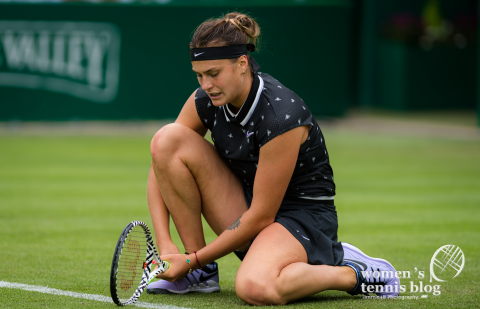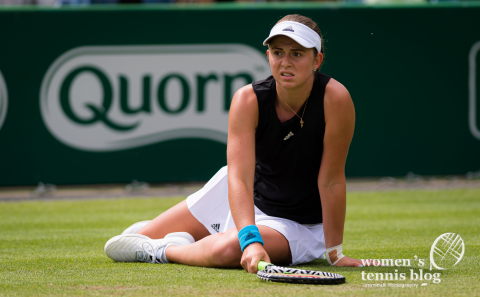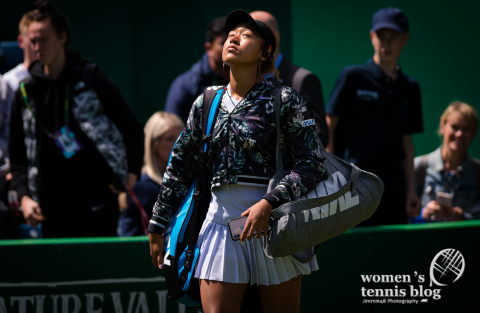Players can get frustrated when things are not going well, they can lose motivation to continue to work hard or they can reach the point where it seems impossible to beat even less advanced players. Loss is never a happy experience and if a player doesn’t know how to deal with it, it can be the beginning of a really sad journey. To make the best of your losses, use tips from our monthly contributor, coach Marcin Bieniek, founder of instructional Enjoy Tennis Blog.

From a coaching perspective, loss doesn’t have to be a negative experience. Unfortunately, most players look at their results as an indicator of self-value, level of confidence and possibility to achieve their athletic dreams. This false perception leads to really negative thoughts and emotions that occur every time a player leaves the court beaten. It is not easy to deal with a defeat if everything is painted in dark colors. That is why it is crucial to take an objective look at the situation and understand what a lost match really means.
Everyone steps on the court with willingness to win, so loss is something unexpected. It is nothing wrong to be sad or angry for a while, but if these emotions last for too long, they will have negative impact on player’s mindset, quality of practice sessions and future results. The best players in the world use losing experience to get better. They know that every match, no matter the score, provides information that can be crucial in the next encounter.
To effectively deal with a lost match you should:

Analyze your performance
During every battle players perform good and bad things. They hit great shots, but they also miss easy balls. It is crucial to get this information to understand the reasons of a loss. Post-match analysis gives valuable information, so the more profound the process is, the more players can get from it. Score can be negative, but it doesn’t mean that positive things didn’t happen.
Learn
Players who lose a match always have the same two options: they can try to forget about the match or they can try to learn from it. The second option is the one that top tennis players use all the time. They analyze the match and try to learn new things to improve their game. How did I return at the end of the first set? How did I react to the mistakes in the won set? How did I use the opponent’s weaknesses? What could I have done better to put more pressure on the opponent? How differently should I have played points while serving? Asking questions and thinking about the match are factors that can transform a lost match into a stepping-stone of big success in the near future.
Create a plan
Set priorities for the next weeks based on conclusions from your last match. They can be related to working on your strengths or you can focus solely on improving weaknesses, if that area cost you too many points during the last competition. It is all about having a goal for every practice. When you step on the court, you have to know what to do and why you do it.

Be real
The last advice is related to your mindset. If you lose a match, don’t get discouraged or too angry. Be real. Tennis is a game of losers. In every tournament only one person finishes without a loss. That’s the reality, so treat an unexpected result as a lesson and another step forward in your career, because loss is negative only when you allow it to be that way.
Dealing with challenges is something that athletes do every day. They deal with missed balls during the practice, they deal with rejection of potential sponsorship agreement and they deal with lost matches. Situations are different, but approach should always be the same – to learn from it, build experience and move forward.
Now you have all the tools to do it effectively, so next time when your opponent advances to the next round, don’t worry and use the opportunity to actually get better.
MORE ARTICLES BY TENNIS COACH MARCIN BIENIEK:
- Tennis strategy to play well in hot environment
- How to improve footwork in tennis, 3 crucial moves to practice
- Transferring tennis practice performance to the tournament environment
- Hardcourt tennis tips, four skills you must work on
- Self-rate your practice session
- Recovery and healthcare techniques to improve your tennis
- How nutrition affects our mental readiness in tennis
- Does one need private tennis lessons?
- How to maximize quality of tennis training sessions
- Post-practice routine for best tennis results
- How to play tennis in the summer heat without getting exhausted
- The reasons you absolutely have to play tennis on all surfaces
- 3 simple products parents miss to buy to help their kids excel in tennis
- How to improve reaction skills in offensive, fast-paced tennis
- How to control anger and frustration to win a tennis match
- Tennis tips: 3 areas that cost you too many points
- How to practice serve the right way
- Coaching tips: How to avoid mistakes in tennis
- Things to (not) do on vacation to improve your tennis game
- How to translate your tennis practice into match wins
- How to build team spirit in tennis
- How to become a master of claycourt tennis
- How to make your serve more effective
- How to choose the best tennis racquet to fit your level, playing style and body type
- How to handle playing tennis in sunny conditions and even take it to your advantage
- 5 portable fitness tools for serious tennis players
- Best foam roller exercises for tennis players




